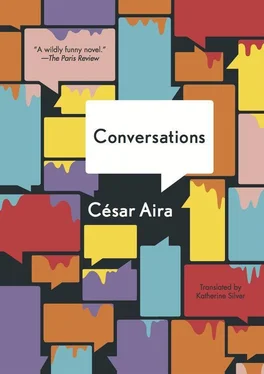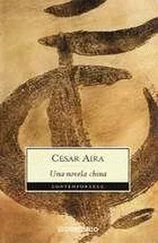There she was found, the following morning, by the handsome goatherd, who, like every morning, was on his way with his goats to the healthy watering places near the peaks. He picked her up, carried her to his hut, tended to her cuts and bruises (few), wrapped her in coarse blankets, and when she woke up, still in shock, he gave her hot soup to drink. Aria recovered with remarkable speed. Therein began one of those relationships, so typical in the movies, according to my friend (and I agreed with him), between two different worlds that are bridged by love. The vast differences between these two worlds were made even more pronounced by the fact that they could not communicate through speech. She assumed that he spoke one of those uncouth dialects that in fact have nothing in common with Russian. The language barrier was that much more impenetrable because she, like everyone else, spoke English, this being a North American production. Even so, they understood each other. Or, at least, she understood a few practical details, the main one being that they would be isolated in the mountains for a predictably long time because below them the mountain passes were covered in ice and snow, which made their descent impossible until the spring melt. There in the highlands, a tectonic combustion of the coal inside the mountains created an ideal temperate microclimate for the wintering of the goats. This explained, by the way, the goatherd’s isolation.
He, in his superstitious ignorance, believed that the beautiful stranger was Señorita Wild Savage, a legendary character from the mountains of Ukraine. This traditional yarn was not ancient, though it had been around for many years, sixty or seventy at least; it dated from the beginning of the Bolshevik beauty contests, which became a popular craze and were encouraged by Moscow as a means for channeling national identity and encouraging Communist eugenics. According to the legend, the first of these contests to be held in Ukraine in the 1920s had two finalists — Miss Wild Savage and Miss Civilized — after representatives from the provinces and various ethnic groups in the country had been excluded. In the highly contested final vote, Miss Civilized won, and Miss Wild Savage, driven to despair, fled into the mountains, where she lived from that time on, alone and untamed. (The change from “Miss” to “Señorita” was a result of the movie being dubbed so it could be shown on television in Argentina.) Of course, nobody with a minimum of sophistication gave any credence to this fable, which could be explained as a nationalist metaphor: the eternal confrontation, which took place at the birth of every national entity, between Civilization and Barbarism. The triumph of Civilization was inevitable, even if the people were not at all optimistic; even when optimism was maximized, Barbarism remained latent, whether in a state of fiction or possibility.
Then followed some scenes that portrayed the daily life of these two young people in the mountains, an accidental idyll, a necessary lull in the plot but also an excuse for a photographic display of the magnificent landscape under a variety of lighting conditions. Those vague sequences with aesthetic content, enhanced by the musical score, gave the audience time to reflect (wisely prompted by certain details in the shots) on the great distance the erotic bridge had to span. These two could not possibly have come from more distant worlds — he, from wild nature; she, from the culture of global corporations and high technology. The inversion in reality of these attributes added an extra zing to this contrast, for he was being played by a Hollywood star and she by a novice Ukrainian actress.
Aria was attracted to the goatherd’s self-reliance, his simplicity, his primitive vigor, qualities that shined in an even more favorable light when compared to those of the men she had known at work and in her social interactions — egotistical, ambitious, and superficial — not to mention that the goatherd was much better-looking. Deep down, she must have suspected that this nascent love had no future: she could not renounce her career as a secretary in exchange for goats and crags, and he could never adapt to urban life. No matter, she let herself be swept off her feet. Or, feelings were stronger than reason; or, Aria anticipated the sweet sadness of separation, which showed that the frivolity of her past life ran very deep. In the meantime, she learned to milk the goats, was enraptured by the night sky, and discovered the secrets of the mountains.
For his part, he continued to believe that he had found the Señorita Wild Savage of the stories, and he was overjoyed. It was the fulfillment of all his wishes. Though primitive, he was a dreamer and had the soul of a poet. The fugitive of the legend had lived in his fantasies ever since he was a small boy, and this had been the reason he had chosen, when he was an adolescent, the solitary and unrewarding work as a hiemal goatherd, disappointing his father, who hoped he would become a blacksmith like him. There in the mountains he felt closer to his ideal of womanhood, ideal even if he knew deep down that she didn’t exist. And now, against all hope, he had found her.
In a precarious high-wire act, the couple was balancing on the fragile spiderweb with which fiction clings to reality. Aria, who was on the side of reality, understood her lover, but did not tell him the truth. She not only knew the legend but it touched her very personally. Her great-grandmother had been the first Miss Ukraine, during the Stalinist era. The documentary details were lost in the successive ideological purges and the fraudulent rewriting of History, which were the trademarks of the Soviet regime. Hence the proliferation of fictional accounts that filled the need for genealogical explanations, which every nation has. And one of the versions of the story claimed that the winner had not, in reality, been Señorita Civilized but rather her rival, for the night before the finale the two had switched identities (they looked very much alike). Whereby the real Señorita Wild Savage had stayed in Kiev representing civilization and modernization and planting within them the seeds of savagery that had prevented Ukraine from joining the chorus of Sustainable Development.
The very hazardous return of this woman’s descendent to the Coal Mountains, Aria thought, smacked of the culmination of Destiny. She was having a firsthand experience of poetic justice, one of the pillars on which sits the art of film. She felt this justice that much more strongly because she knew that if it were a movie, she and her great-grandmother would be played by the same actress (they always do that). But in this movie, in particular — my friend said, raising his voice in a triumphant finale of “I told you so” — she knew it was a movie!
While I was reconstructing these words, in bed, I realized that the images had joined hands with the words, as always happens when films are invoked. But I had to remember, I reminded myself then, in retrospect, that words, not images, were what we had; that it was with words that we were going to solve our little puzzle; the images that overwhelmed me in the mental fog of semi-somnolence could only further distance me from the solution. I ascertained this at my own expense when I saw that I had not grasped the meaning of my friend’s last statement. Thinking about it a little, I realized that I didn’t understand it because it could not be understood. It was obviously absurd, and with it, we were returning to the point of departure. I knew what reductio ad absurdum was, but for the moment I still could not grasp that a statement could be affirmed through the absurd. The only remaining possibility was that after tracing a large circle, my poor friend would return to his initial confusion — now from a psychological standpoint — and believe that after all he had convinced me that the actor was the same as the character. Which meant that he was an idiot, and that I would have to relapse into my previous fears and sorrows.
Читать дальше












